
GLASGOW ― The latest edition of the Asian Cup began in Qatar on January 12. Over the past three weeks, the group stages and round of 16 have taken place.
Japan, the most successful team in tournament history with four titles, arrived in Qatar as a strong favorite ― its squad depth, quality and pre-tournament nine-match winning streak made it the logical pick to win the trophy on February 10 for many observers.
But with high expectations comes pressure. Players and coaches still have to deliver in the key moments and mistakes must be kept to a minimum.
In setting the scene for what we hope is a run to the final, I will look back at Japan's performances in the tournament so far, highlighting the positive and negative aspects of the team's play as the Asian Cup reaches its business end.
Squad is Stacked in All Areas Apart from Goalkeeper
Heading to Qatar, Samurai Blue manager Hajime Moriyasu picked a 26-man squad made up of many experienced players. Twenty members of the squad selected currently play in European leagues.
Big names and seasoned international players such as Takumi Minamino, Ritsu Doan, Ko Itakura, Takehiro Tomiyasu and captain Wataru Endo were all included.
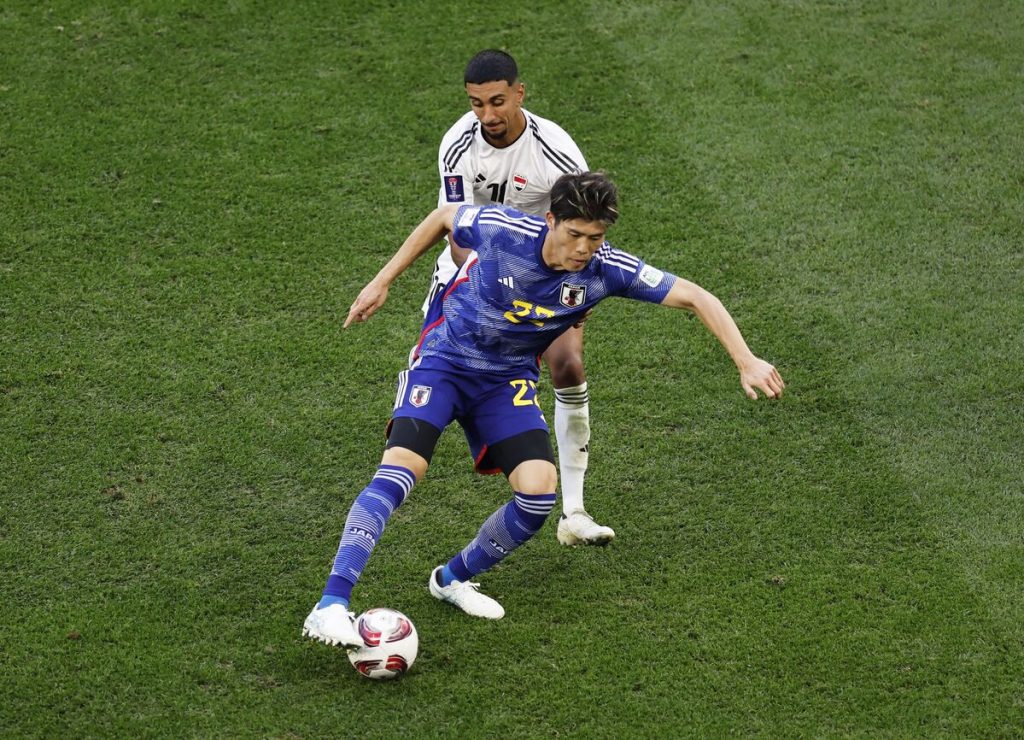
Mixed in with that core were younger and lesser-capped players looking to make their mark by contributing to a successful tournament for Japan. Yuta Nakayama, Keito Nakamura, Takefusa Kubo, Seiya Maikuma and Ayase Ueda all fall into this category.
Despite carrying an injury, Kaoru Mitoma was included in the hope he could contribute in the latter stages.
The one area of Japan's squad that looked light was the goalkeeper position. Between them, selected 'keepers Daiya Maekawa, Taishi Brandon Nozawa and Zion Suzuki only had a combined five caps when the squad departed for Qatar.
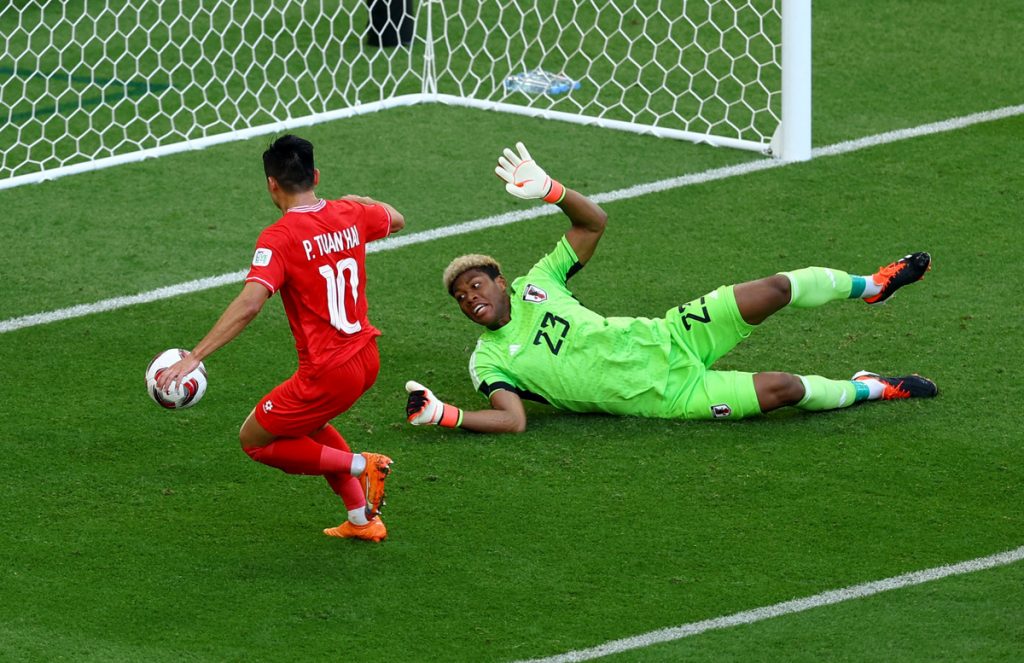
Matchday One - Japan versus Vietnam - January 14 at Al Thumama Stadium
Japan opened its Group D campaign against Vietnam. It appeared to be a straightforward assignment ― Japan, No 17 in the current FIFA rankings, would need to have a terrible day if it was to be defeated by 94th-ranked Vietnam.
Fast-forward to the 32nd minute and Japan trailed 2-1. There was no need to panic, but the opening to the match had revealed some areas for Moriyasu and his coaching staff to work on.
Namely how unsettled his defense and goalkeeper looked as a unit. After taking an early lead through Minamino's 10th-minute shot, the Samurai Blue allowed an energetic Vietnam back into the game.
Suzuki was the goalkeeper selected and his tournament got off to a poor start as bad positioning allowed a front-post flick-on from a corner to sail into his net.
Worse was to come. This time a free kick floated into Japan's penalty area and was headed toward goal. Suzuki chose to parry the effort instead of catching it. His block landed at the feet of a grateful opponent who scored easily.
Japan was able to recover with goals from Minamino, his second of the day, and a superb curling effort from 20 yards (about 18 meters) from Nakamura. With these, Japan took a 3-2 lead into halftime.
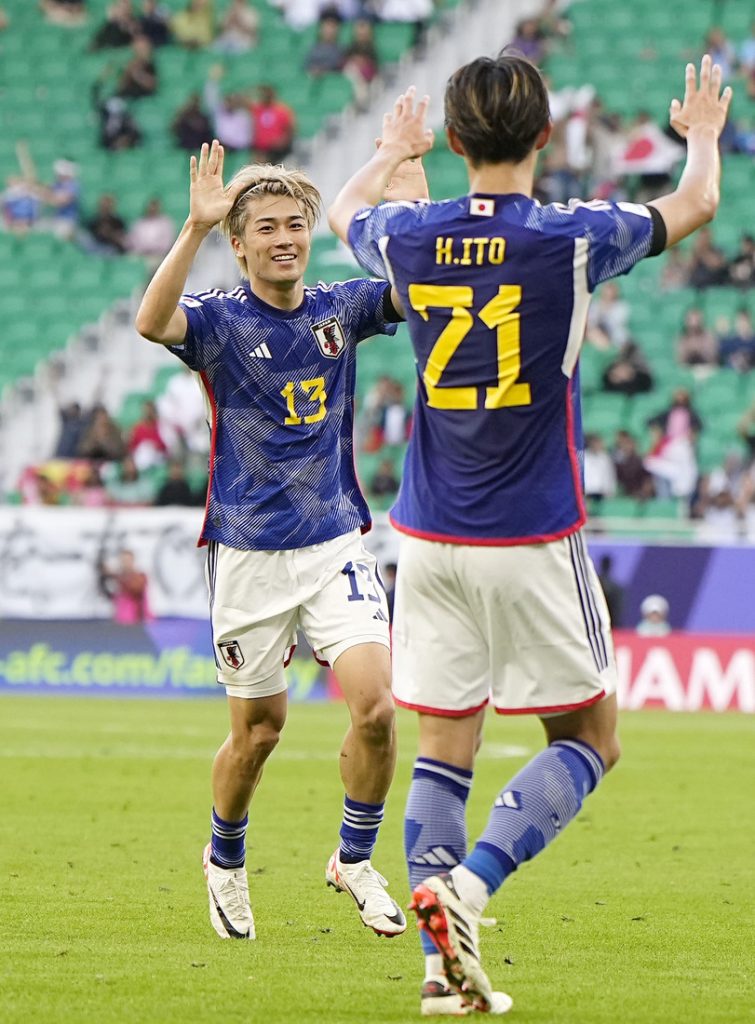
The second half was largely played on Japan's terms. Japan found the net once more as Ueda, introduced from the bench, opened his tournament account in the 84th minute to seal a 4-2 victory.
While opening matches in tournaments are never easy to negotiate and just getting a win is paramount, this one suggested Japan needed to work on its defensive shape from set pieces.
Matchday One Grade: C
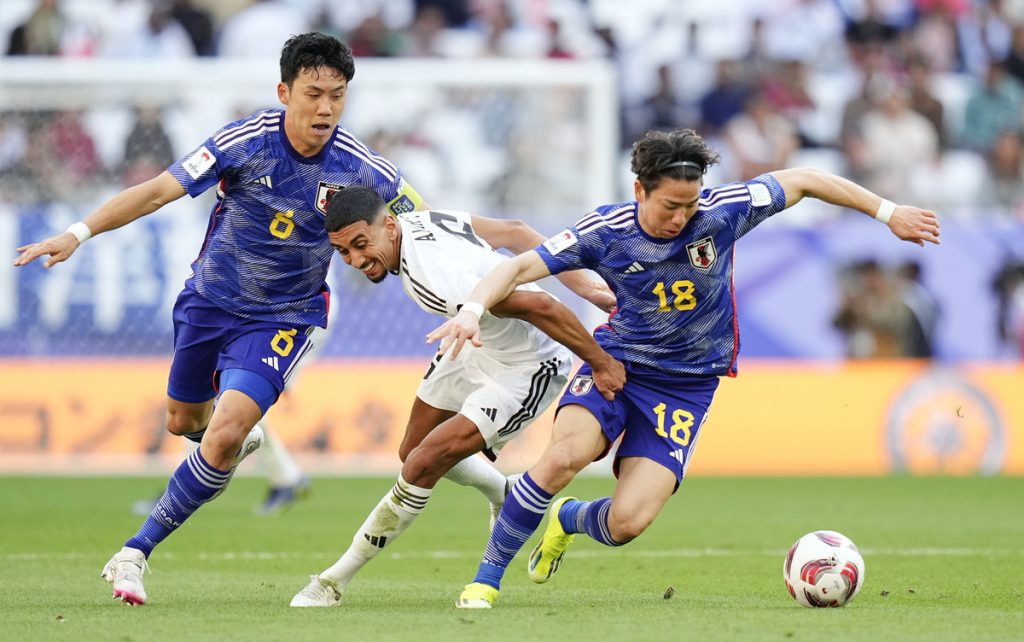
Matchday Two - Japan versus Iraq - January 19 at Education City Stadium
Ranked 63rd by FIFA and coming off a 3-1 win over Indonesia in its opening fixture, Iraq looked like it would provide Japan with a tougher test than Vietnam.
It certainly played out that way as Iraq, employing a physical game plan, was able to grind out a 2-1 win.
Moriyasu resisted the temptation to make any defensive changes after the opening fixture. The only two changes occurred in the attacking areas of the field with Kubo starting in place of Nakamura while Takuma Asano started up front instead of Mao Hosoya.
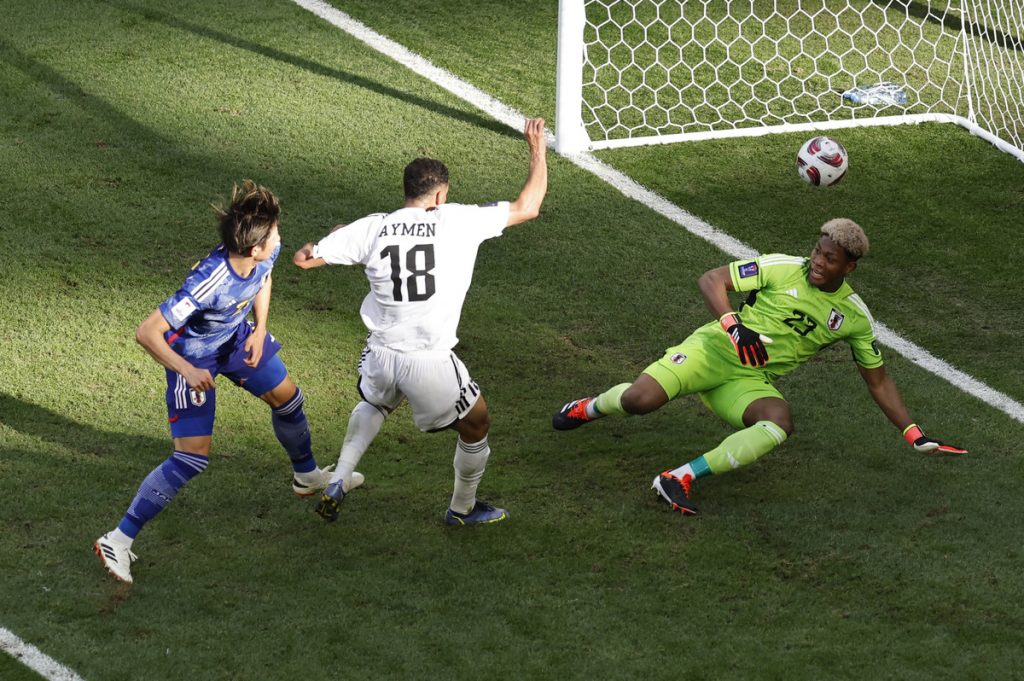
On this day, it was another striker who grabbed the headlines. Iraq's Aymen Hussein was a nuisance for Japan's defense all day and the powerful forward's brace won the match for his team.
His first goal again highlighted Japan's goalkeeping issue as Suzuki weakly parried a cross into a dangerous area. Hussein gratefully headed the second chance into the net.
Just before halftime Hussein scored again. Another cross from the left, another header. That made it 2-0, Iraq.
Japan, with 72% possession dominated the game but it couldn't break down Iraq's stubborn 4-5-1 formation. The Samurai Blue did find the net in injury time as Endo headed in Reo Hatate's corner but it was merely consolation.
Matchday Two Grade: D
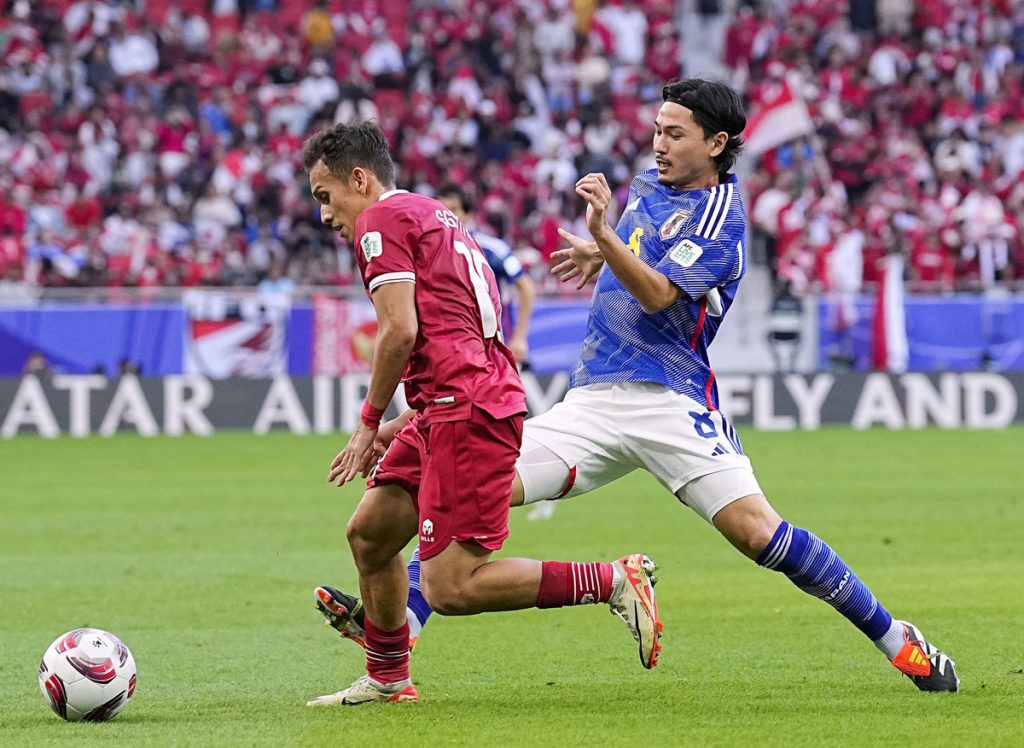
Matchday Three - Japan versus Indonesia - January 24 at Al Thumama Stadium
Japan put in its most complete performance of the tournament so far against 146th-ranked Indonesia. Despite its low ranking, Indonesia had upset Vietnam earlier in the tourney, 1-0 on January 19. So it entered this game with confidence.
Moriyasu made eight changes to the starting lineup. A new back four was in place and Ueda got his first start at striker. Suzuki remained in goal as Moriyasu gave his young custodian a vote of confidence.
Japan dominated from start to finish. With 14 attempts on goal, the Samurai Blue produced good value in their 3-1 win.
A brace from Ueda and an own goal from Indonesia defender Justin Hubner ensured Japan wouldn't suffer a second successive defeat and a disastrous early exit from the tournament.
In injury time at the end of the game, its defensive frailty struck again, though. A long throw into the penalty area was not properly defended and Sandy Walsh side-footed home at the back post to deny Japan a clean sheet.
Matchday Three Grade: B-
Moriyasu's Take Before the End of the Round of 16
With many opinions swirling around, manager Moriyasu spoke with reporters ahead of Japan's last-16 fixture.
"We must never go into a game in a way that hands momentum to our opponents," the manager said, according to Kyodo News.
Moriyasu continued, "The players are heading into the match [against Bahrain] in good condition both mentally and physically."
Perhaps in an attempt to take some pressure off his team, Moriyasu also noted: "There was some sense within the team that we needed to dominate games. But realistically, we can't dominate. We have to create space and attack there."
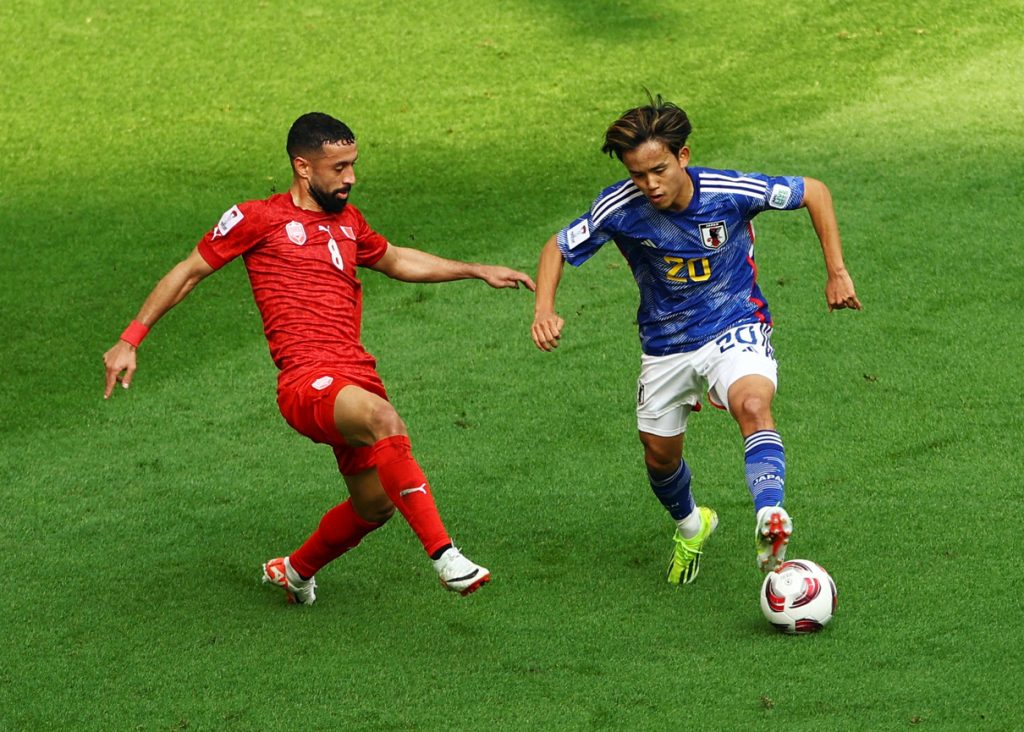
Round of 16 - Japan versus Bahrain - January 31, Al Thumama Stadium
Japan ended the group stage as Group D runner-up. That meant it would face the Group E winner in a last-16 encounter.
Bahrain, No 86 in the world rankings, emerged as top of the pile in Group E ― no mean feat considering South Korea was included in that section. Nevertheless, Japan convincingly won the match 3-1.
Moriyasu only made one change to the lineup that started against Indonesia. Itakura regained his place in defense at the expense of Koki Machida.
Japan dominated against an opponent that was reluctant to break out of its ultra-defensive 4-1-4-1 formation. Doan, Kubo and Ueda, Japan's three main attacking threats, bagged the goals that secured a quarterfinal berth.
Unfortunately, a minute of madness from Suzuki once again blotted Japan's copybook. Midway through the second half, with Japan 2-0 up, he punched a ball back into play instead of catching it. From that phase of play, Bahrain forced a corner.
Then, from the corner, Suzuki pushed Sayed Mahdy's header weakly up into the air, and the ball tumbled toward Japan's net with Suzuki flapping and falling into it. In the 64th minute, the struggling goalkeeper only succeeded in touching the ball over the line. Bahrain was back in the game and Suzuki was credited with an own goal.
Round of 16 Grade: B
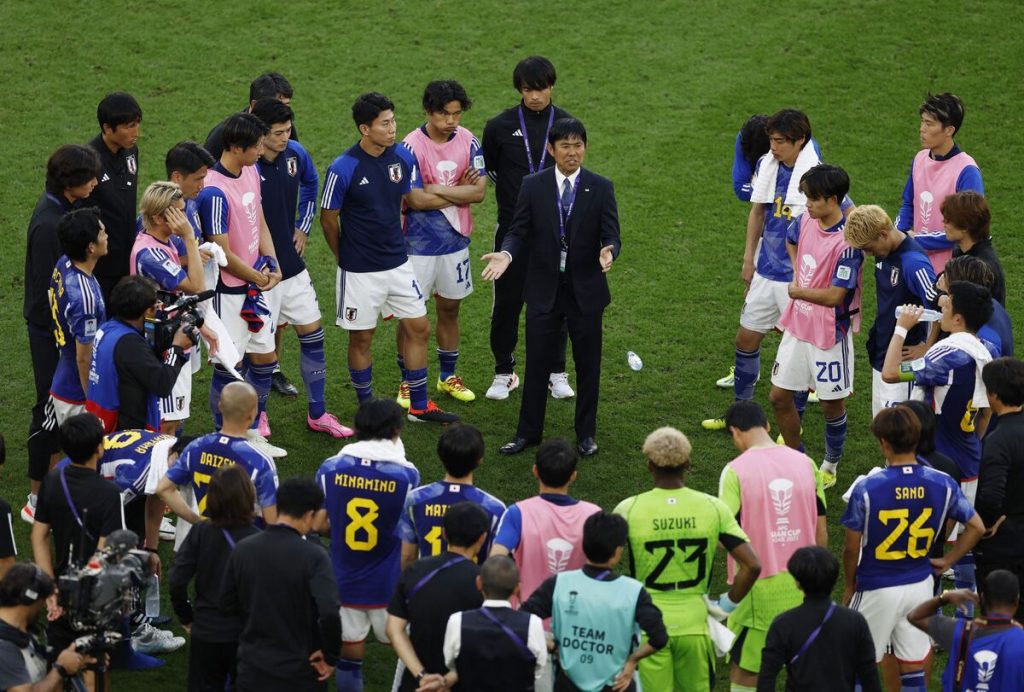
Overall Analysis
Japan is like two teams within a team. Excellent going forward but extremely suspect in defense.
Like a chain, a team is only as strong as its weakest point. With Suzuki in goal and making in excess of one serious misjudgment per game, it might be difficult for this Japan team to win the Asian Cup.
As the tournament progresses and the standard of opposition increases, one error can send you crashing out.
With capable teams like Qatar, South Korea and Australia still involved, the importance of being defensively sound can't be stressed highly enough.
Moriyasu seems to have settled on a back four of Tomiyasu and Itakura in the center, with fullbacks Nakayama and Maikuma, both of whom began the tournament as squad players, showing they are worthy of inclusion. Maikuma in particular was immense against Bahrain.
Hatate and Endo seem to be the favored defensive midfield duo although Hidemasa Morita started the competition alongside Endo and he replaced the injured Hatate early on against Bahrain.
Attacking-wise Ueda looks like the most accomplished central striker in the squad. Behind him, Doan, Kubo and Nakamura are performing well. Minamino is an excellent option from the bench and Mitoma made an eye-catching cameo against Bahrain, which suggests he is now back to full fitness.
Moriyasu needs to find a way to get his defense playing with confidence, especially when defending set pieces. It looks like he will stick with Suzuki in goal ― but the 'keeper needs to reward his manager's faith with more assured performances from now on.
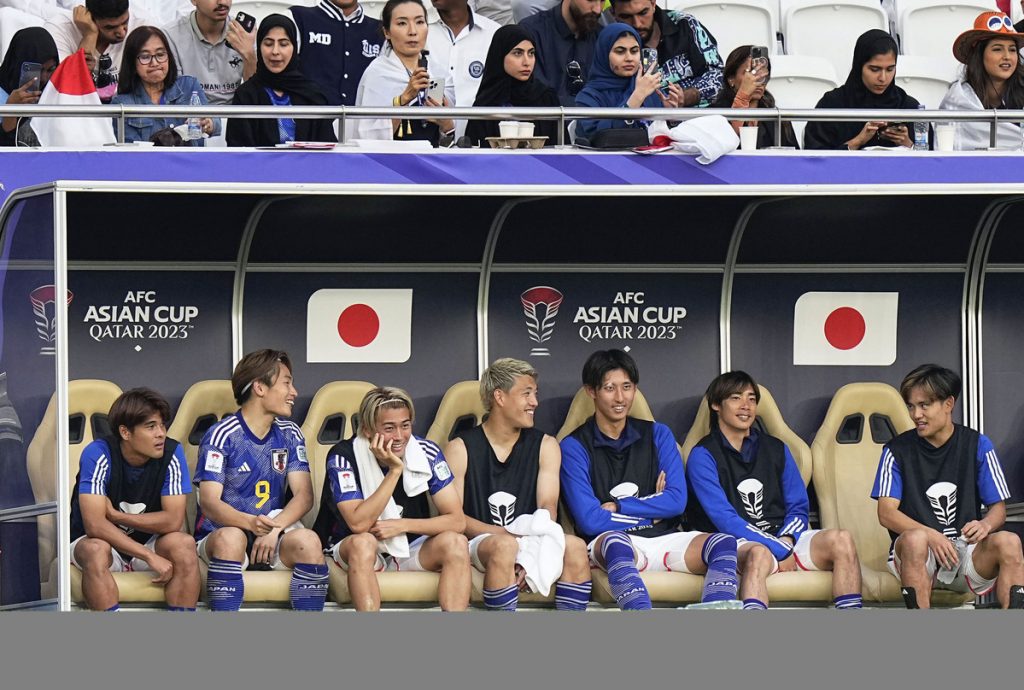
Coming Next…
On Saturday, February 3 at 8:30 PM JST Japan will face Iran in the quarterfinals. It will see the two highest-ranked teams in the tournament face off. Iran is currently ranked 21 by FIFA.
Iran won all three of its group fixtures and overcame Syria via a penalty shootout in the round of 16 following a 1-1 draw.
The Iranians will present the toughest opposition Japan has faced in this tournament so far. Going by the rankings they are the two best squads in the competition. One of them will be going home before the semifinals.
RELATED:
- [JAPAN SPORTS NOTEBOOK] Asian Cup Upset: Focused Iraq Powers Past Japan
- ANALYSIS | The Top 10 Japanese Footballers in Europe
Author: Colin Morrison
Morrison is a freelance sportswriter. Find his stories on SportsLook. Writing since 2016, his byline appears on boxing website NYFights.com and multi-sports platform Spitballingpod.com. His main areas of interest are boxing, soccer, golf and rugby union. Morrison is from Scotland and can be found on X (formerly Twitter) @Morrie1981.







